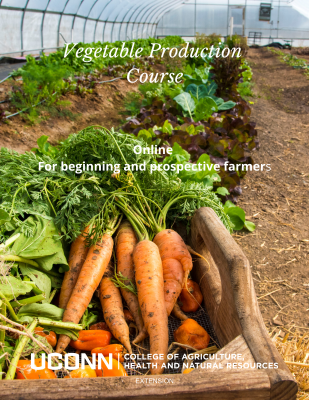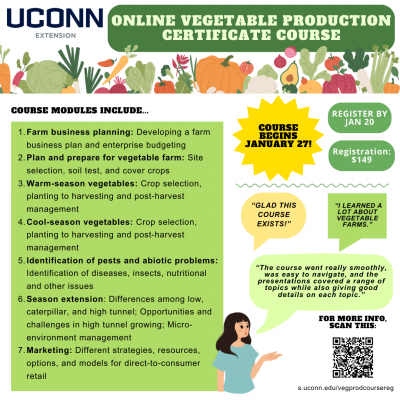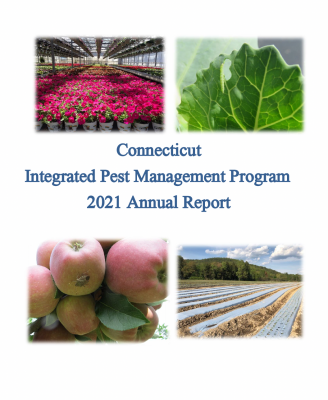UConn Extension offers an online Ornamental & Turf Short Course in the fall and winter. This Short Course is an in-depth review of the information necessary to study for the Ornamental and Turf/Golf Course Superintendents State of Connecticut Supervisory Pesticide Applicator Certification (category 3A) exam. A student who completes all the modules, works through the quizzes, and studies the resource materials independently should be able to pass both the written and oral state exam successfully.
2025 Online Vegetable Production Certificate Course
2025 Online Vegetable Production Certificate Course
November 19, 2024
We’re offering a Vegetable Production Certificate Course, beginning on January 27, 2025. It is a fully online course for new and beginning farmers who have 0-3 years of vegetable growing experience or no formal training in agriculture. The participants will learn answers to the basic questions about farm business planning, planning and preparing for vegetable farm, warm and cool-season vegetable production techniques, season extension, identification of biotic and abiotic issues, and marketing. The price of the course is $149.
Please contact the course coordinator, Shuresh Ghimire (Shuresh.Ghimire@uconn.edu, 860-870-6933) with any questions about this course.
Registration deadline: January 20, 2025 Register at s.uconn.edu/vegcoursereg
Course Description
This vegetable production course is designed to benefit beginner vegetable producers who have 0-3 years of vegetable growing experience or no formal training in agriculture. The participants will learn answers to the basic questions about farm business planning, planning and preparing for vegetable farm, warm and cool-season vegetable production techniques, season extension, identification of biotic and abiotic issues, and marketing.
- The course consists of seven online modules, each of which include a self-paced video, supplemental material, and a short quiz.
- The slides presented in the video are also provided in a downloaded PDF file for note-taking and future reference.
- The supplemental materials are great addition to your personal reference library and valuable resources for all farmers.
- The module quizzes are designed to test your knowledge of the key points within the specific module.
- Each module is expected to take you approximately one hour to complete, although this varies by user.
Course Learning Objectives
At the end of this course, you will be able to:
- Develop a farm business plan, which will help you keep records, manage time more effectively, and price products.
- Explain the characteristics of a suitable site for commercial vegetable crop production and adjust as needed.
- Perform soil sampling protocols for nutrient analysis.
- Explain full season tasks involved in vegetable farming including planting, in-season care, harvesting, and post-harvest considerations for some warm-season and cool-season vegetables.
- Scout and identify biotic and abiotic issues.
- Explain tools for season extension.
- Understand different strategies, resources, options, and models for direct-to-consumer retail.
- Identify additional reliable and fact-based informational resources on topics related to vegetable farming.
Table of Contents
1. Pretest: 25 questions
2. Farm business planning: Developing a farm business plan and enterprise budgeting
3. Plan and prepare for vegetable farm: Site selection, soil test, and cover crops
4. Warm season vegetables: Crop selection, planting to harvesting and post-harvest management
5. Cool-season vegetables: Crop selection, planting to harvesting and post-harvest management
6. Identification of pests and abiotic problems: Identification of diseases, insects, nutritional and other issues
7. Season extension: Differences among low, caterpillar, and high tunnel; Opportunities and challenges in high tunnel growing; Micro-environment management
8. Marketing: Different strategies, resources, options, and models for direct-to-consumer retail.
9. Post-test: 25 questions
Course Dates (2025)
While this is an asynchronous course which you may work through at your own pace between January 27 and March 11, a recommended class schedule is listed below:
Jan 27 – 31 – Complete the Online pre-test (pre-course quiz)
Feb 1 – 4 – Module 1 – Farm Business Planning
Feb 5 – 9 – Module 2 – Planning and preparing for a vegetable farm
Feb 10 – 14 – Module 3 – Warm Season Vegetables
Feb 15 – 19 – Module 4 – Cool Season Vegetables
Feb 20 – 24 – Module 5 – ID Pest and Abiotic Problems
Feb 25 – Mar 1 – Module 6 – Season Extension
Mar 2 – Apr 6 – Module 7 – Marketing
March 7 – 11 – Complete the post-test
Course Instructors Abby Beissinger, Former Assistant Extension Educator, UConn
Bruce Gresczyk Jr., Gresczyk Farms
Jiff Martin, Extension Educator, UConn
Joe Bonelli, Retired Associate Extension Educator, UConn
Kip Kolesinskas, Consulting Conservation Scientist
Shuresh Ghimire, Assistant Extension Educator, UConn
Steve Munno, Massaro Community Farm
Please contact the course coordinator, Shuresh Ghimire (shuresh.ghimire@uconn.edu, 860-870-6933) with any questions about this course.
Registration is now open! Fall Ornamental & Turf Short Course
UConn Extension offers an online Ornamental & Turf Short Course in the fall and winter. This Short Course is an in-depth review of the information necessary to study for the Ornamental and Turf/Golf Course Superintendents State of Connecticut Supervisory Pesticide Applicator Certification (category 3A) exam. A student who completes all the modules, works through the quizzes, and studies the resource materials independently should be able to pass both the written and oral state exam successfully.
View Ornamental & Turf Short Course Flyer
Flood Resources and Pest Message 08202024
May 2024 Crop Talk
The May 2024 issue of Crop Talk is available. The issue includes the following articles:
- Managing Aphids on Vegetable Transplants
- Can Biochar be a Sustainable Soil Amendment for CT Farms?
- Spring Fungal Disease Outlook for Fruit Growers
- Soil Steaming for Pest Management
- Sweet Corn Pest ID & Trapping
Climate Smart Mitigation & Adaptation Workshop
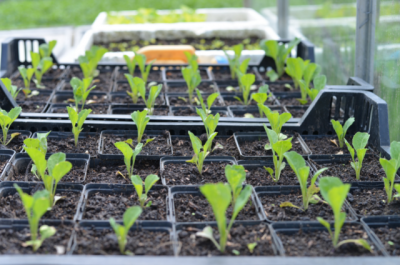 Climate Smart Mitigation & Adaptation Strategies Workshop
Climate Smart Mitigation & Adaptation Strategies Workshop
Wednesday, December 6th – 9 a.m. to 3 p.m.
This UConn Extension workshop, in partnership with USDA RMA, will assist producers in understanding the seasonal risks, challenges and opportunities associated with our changing climate. We will outline many of the strategies that have emerged for:
- Successful adaptation
- Reducing risks
- Build farm and land resiliency
Examples and tools suitable for a wide variety of kinds and farms sizes will be included.
You will be provided with a template and tools to:
Participants will also learn of tools and programs available from USDA RMA, USDA FSA, USDA NRCS, and the CT Department of Agriculture.
Lunch will be provided free of cost.
Location: UConn Extension – Middlesex County, 1066 Saybrook Road, Haddam, CT
Register by December 5th to reserve your spot – s.uconn.edu/climateworkshop
UConn complies with all applicable federal and state laws regarding non-discrimination, equal opportunity, affirmative action, and providing reasonable accommodations for persons with disabilities. Contact: Office of Institutional Equity; (860) 486- 2943; equity@uconn.edu; http://www.equity.uconn.edu.
This material/event is funded in partnership by USDA, Risk Management Agency, under award number RMA23CPT0013448
June 2023 Crop Talk
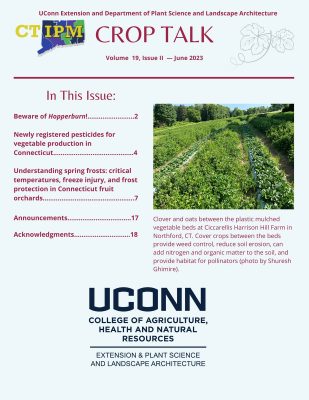
The June 2023 issue of Crop Talk is available. The issue includes the following articles:
- Beware of Hopperburn!
- Newly Registered Pesticides for Vegetable Production in Connecticut
- Understanding Spring Frosts: Critical Temperatures, Freeze Injury, and Frost Protection in Connecticut Fruit Orchards
UConn Extension’s Vegetable & Small Fruit Growers’ Conference and Trade Show PDFs
The 2023 CT Vegetable and Small Fruit Growers’ Conference was held Wednesday, January 4. Please find below the PDF versions of the presentations. We hope to see you again in 2024!
Drone Imaging to Monitor Potato Leafhopper Damage in the Field
Vegetable benefits and disease control of nanotechnology
Vegetable Twilight Meeting at Cold Spring Brook Farm, Sept. 2022
UConn Extension held a Vegetable Twilight Meeting at Cold Spring Brook Farm in Berlin, Connecticut on September 21, 2022. The video below is a recording of the meeting, and the handouts shared are also included.
Handouts
Handout 1 – Uneven Ripening in High Tunnel Tomatoes
Handout 3 – Biodegradable Mulch
Twilight Meeting Recording
Our work with high tunnel vegetable production is supported by USDA NRCS Conservation Innovation Grant Award # NR203A750008G009/Subaward # 0008145/07132020, and our work with biodegradable plastic mulch is supported by USDA Crop Protection Pest Management Program Grants # 2021-70006-35582 and 2017-70006-27201.
2021 IPM Annual Report is Available
The 2021 IPM Annual Report is available. The Integrated Pest Management (IPM) Program is a collaboration between UConn Extension and the Department of Plant Science & Landscape Architecture. Since its inception in 1980, the UConn IPM Program has made great strides in developing and implementing sustainable methods for pest control throughout Connecticut. Integrated Pest Management applies multiple tactics in a variety of settings through the selection of appropriate tools and the education of agricultural industry members and Connecticut citizens to provide sustainable, science-based approaches for the management of plant pests (insects, mites, diseases, wildlife, and weeds, including invasive plants). The UConn IPM Program incorporates all possible crop management and pest management strategies through knowledgeable decision-making, utilizing the most efficient landscape and on-farm resources, and integrating cultural and biological controls. Program objectives include maintaining the economic viability of agricultural and green industry businesses, enhancing and conserving environmental quality and natural resources, educating participants on the effective use of cultural practices to mitigate pest problems, of biological control agents, and educating pesticide users about bee and other pollinator safe materials, least toxic options, and the safe use and handling of organic and synthetic pesticide products. The 2021 IPM Program Team included Mary Concklin (fruit and IPM Coordinator), Leanne Pundt (greenhouse), Victoria Wallace (school, invasive, pollinators, turf and landscape), Ana Legrand (vegetables), Shuresh Ghimire (vegetables and hemp), and Nick Goltz (diagnostician, hired August 2021).
The goal of IPM is to reduce the dependence of agricultural producers and green industry professionals, Connecticut citizens, and schools on pesticides while maintaining or improving productivity, crop quality, and quality of life. The IPM Program has educated growers statewide about the judicious and safe use of organic and synthetic pesticides and alternative pest control methods.
Broader adoption of IPM practices enhances responsible pest management and reduced management and production costs; minimizes adverse environmental and economic effects from pests and pest management; results in improved ecosystem quality and plant performance; and improves plant health, quality, yields, and aesthetics. The use of IPM includes cultural controls; biological control agents; biological fungicides; physical and mechanical controls; the use of resistant cultivars; regulatory controls; behavioral modification; and, only when necessary, chemical controls, with the selection of least toxic products. IPM partners and collaborators include State and Federal agricultural and environmental/non-governmental agencies and organizations; State, New England, and Northeastern fruit, greenhouse, grounds keepers, nursery, turf, landscape, and vegetable associations; industry suppliers/dealers; regional universities; educators; schools and municipalities; individual growers, farmers, and producers; Master Gardeners; and the general public.
COVID-19 impacted many outreach programs usually conducted face-to-face beginning in 2020, with continuing restrictions due to the Delta variant in 2021. However, our team members continued to adapt and offered many programs virtually, with a few in-person as well as in-person site visits with safety protocols in place and adhered to. In pre-Covid years, IPM Program team members conduct intensive on-site educational training for fruit and vegetable producers, garden center owners, greenhouse growers, nursery producers and retailers, and turf and landscape professionals. Growers and green industry professionals receive information on the current status of and recommendations for important plant pests and training via pest messages, email alerts, webinars, newsletters, articles in national trade journals, management guides, websites, social media, consultations and counseling via phone and text, site visits to their operations, workshops, field demonstrations and research projects, conferences, exhibits, and short courses. IPM programs are evaluated through pre- and/or post-program surveys and evaluations, needs assessment surveys, focus groups, key informant interviews, testimonials, and unsolicited comments. Read the full report.
